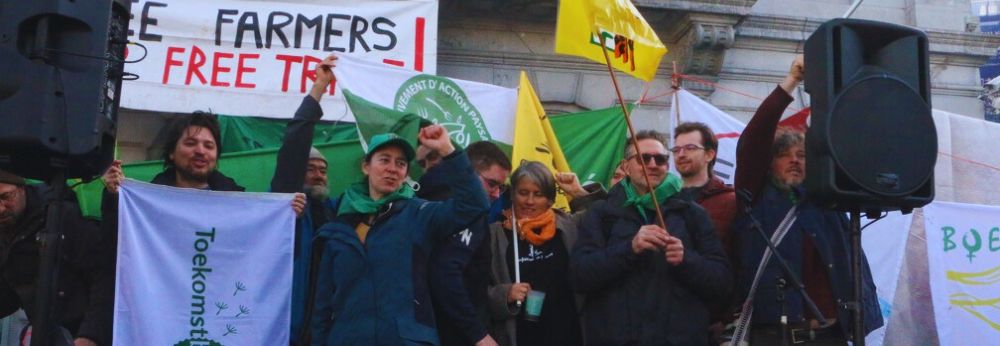EU Elections: ECVC calls for fairer prices, market regulations and better working conditions

“Europe today has around 9 million farms, down from 15 million in 2003, and the average age of farmers is 57 years old. They struggle to access seeds, land, water and the market. Public policies prioritise market interests and corporate profits over human rights and feeding the population.” European Coordination Via Campesina (ECVC. )
The ninth legislature of the European Parliament began in 2019 in an atmosphere of hope and high ambitions. The advent of the Green Deal, the Farm to Fork Strategy, and in particular the related objectives seemed to hold the promise of a move towards sustainable food systems.
However, over the past two years, these policies have been stripped of ambition and substantive content, amid uncertainty and fear. The global political situation and European public policies have been shaken by war, climate disasters and social, health, and economic crises, characterised by an increasingly simplistic, populist and polarised political discourse, leading to the rise of extreme right in many countries. Added to this is the pressure from European institutions towards false solutions such as carbon farming and GMOs. The question raised in this context is whether we want the EU to serve the interests of citizens or businesses.
EU farmers have been taking to the streets since January 2024, to demand fair prices, the end of Free Trade Agreements, a fairer CAP, and a reduced administrative burden for farmers. This manifesto is released in the midst of EU proposals and votes so no quick conclusions can be drawn. However elements on the value chain are promising and must be turned into concrete action. Similarly, proposals on simplifying bureaucracy cannot be implemented without addressing the huge climate and environmental challenges of our time. Here again it is crucial to ensure that interests of farmers and citizens are prioritised.
The impact on agriculture and food has been considerable in an already uncertain context. Europe today has around 9 million farms, down from 15 million in 2003, and the average age of farmers is 57 years old. They struggle to access seeds, land, water and the market. Public policies prioritise market interests and corporate profits over human rights and feeding the population.
The limits of the current system, of the increasing industrialisation of agriculture (particularly in livestock farming), and of the misleading subsidy mechanisms of the CAP are more and more obvious. Biodiversity is collapsing, soils are deteriorating, climate change is accelerating and farmers are the first to pay the price.
Yet, in the face of all this, peasant farmers continue to bring solutions and hope to populations. They continue to concretely cultivate an alternative, more resilient agricultural model, based on food sovereignty and peasant agroecology. This model is capable of feeding all citizens, thanks to a social approach that makes it possible to face multiple systemic crises and is best adapted to the unique realities of each European territory.
This type of small-scale farming is only possible with a large number of farms and good living and working conditions for farmers and agricultural workers throughout Europe. Policies must support current farmers and enable them to transition to sustainable models. These policies must encourage generational renewal so that more people and more young people can enter the profession.
We must build bridges of solidarity and understanding between urban and rural areas and deconstruct the current polarising rhetoric. We must show solidarity with the rest of the world and address the issue of fairer international agricultural trade.
In a context of agricultural uprising across Europe, there are clear demands for fairer prices and agricultural markets and better working conditions. The European elections in June 2024 must allow our decision-makers to organise a transition of agricultural and food systems based on this vision of food sovereignty.
